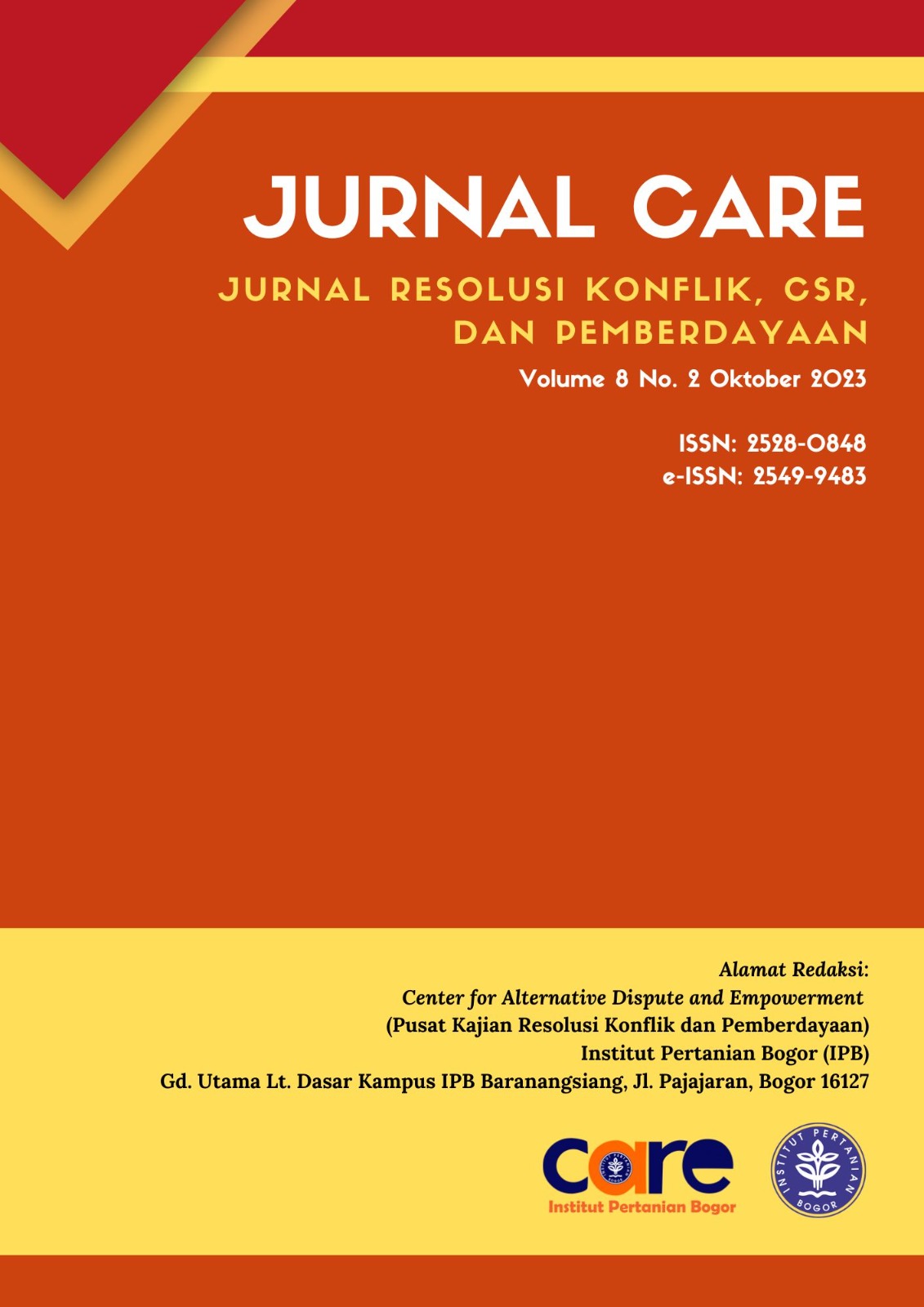Dampak Akses-Infrastruktur, Penggunaan, Dan Keahlian Teknologi Informasi Dan Komunikasi Terhadap Pertumbuhan Ekonomi Indonesia
Abstract
Pembangunan Teknologi Informasi dan Komunikasi (TIK) semakin pesat dan pemerintah akan memanfaatkannya sebagai sumber pertumbuhan ekonomi utama di masa depan. Penelitian ini bertujuan untuk mengukur dampak pembangunan TIK terhadap pertumbuhan ekonomi Indonesia secara keseluruhan dan membandingkannya antara Indonesia bagian barat dan Indonesia bagian timur. Variabel independen utama yang digunakan, yaitu subindeks akses-infrastruktur TIK, subindeks penggunaan TIK, serta subindeks keahlian TIK. PDRB digunakan sebagai variabel dependen. Data terdiri dari 33 provinsi sepanjang tahun 2012 – 2021. REM menjadi pilihan terbaik untuk ketiga model. Berdasarakan hasil model pertama sisi akses-infrastruktur dan penggunaan TIK secara signifikan berdampak positif terhadap pertumbuhan ekonomi. Sementara itu, hasil model kedua dan ketiga menunjukkan bahwa Indonesia bagian timur merasakan dampak lebih besar untuk sisi akses-infrastruktur. Sedangkan, pada sisi penggunaan hanya Indonesia bagian barat saja yang secara signifikan berdampak positif.
Kata Kunci: Akses-Infrastruktur, Keahlian, Penggunaan, Pertumbuhan Ekonomi, TIK
References
Badan Pusat Statistik [BPS]. 2022. Indeks Pembangunan Teknologi Informasi dan Komunikasi 2021. BPS RI: DKI Jakarta, Indonesia.
Batool Z, Ali S, Rehman A. 2022. Environmental Impact of ICT on Disaggregated Energy Consumption in China: A Threshold Regression Analysis. Sustain. 14(23):1–17. doi:10.3390/su142315600.
Corrado C, Haskel J, Jona-Lasinio C. 2017. Knowledge Spillovers, ICT and Productivity Growth. Oxf Bull Econ Stat. 79(4):592–618. doi:10.1111/obes.12171.
De La Hoz-Rosales B, Camacho Ballesta JA, Tamayo-Torres I, Buelvas-Ferreira K. 2019. Effects of Information and Communication Technology Usage by Individuals, Businesses, and Government on Human Development: An International Analysis. IEEE Access. 7:129225–129243. doi:10.1109/ACCESS.2019.2939404.
Dudzevičiūtė G, Šimelytė A, Liučvaitienė A. 2018. Government expenditure and economic growth in the European Union countries. Int J Soc Econ. 45(2):372–386. doi:10.1108/IJSE-12-2016-0365.
Hall BH, Lotti F, Mairesse J. 2012. Evidence on the Impact of R&D and ICT Investment on Innovation and Productivity in Italian Firms. SSRN Electron J., siap terbit.
Hapsari RD, Prakoso I. 2016. Penanaman Modal Dan Pertumbuhan Ekonomi Tingkat Provinsi Di Indonesia. J Ekon dan Bisnis. 19(2):211. doi:10.24914/jeb.v19i2.554.
Heshmati A, Yang W. 2006. Contribution of ICT to the Chinese economic growth. RATIO Inst Techno-Economics., siap terbit. https://core.ac.uk/download/pdf/7088842.pdf.
Ibrahimi AE, Fetai B. 2022. The Impact of ICT on the GDP Growth of Western Balkan Countries. SEEU Rev. 17(1):105–119. doi:10.2478/seeur-2022-0044.
Karaman Aksentijević N, Ježić Z, Zaninović PA. 2021. The effects of information and communication technology (ICT) use on human development—A macroeconomic approach. Economies. 9(3). doi:10.3390/economies9030128.
Majeed MT, Ayub T. 2018. Information and Communication Technology (ICT) and economic growth nexus: A comparative global analysis. Pakistan J Commer Soc Sci. 12(2):443–476.
Mankiw, NG. 2010. Macroeconomics seventh edition. Worth Publishers: New York, USA.
National Development Planning Agency (Bappenas). 2020. Rencana Pembangunan Jangka Menengah Nasional 2020-2024. Natl Mid-Term Dev Plan 2020-2024., siap terbit.
Ojo SM, Ogunleye EO. 2021. Technological Leapfrogging and Manufacturing Value-added in sub-Saharan African (1990-2018). Papers., siap terbit. https://login.ezproxy.library.ualberta.ca/login?url=https://search.ebscohost.com/login.aspx?direct=true&db=edsrep&AN=edsrep.p.arx.papers.2103.16049&site=eds-live&scope=site.
Olamide E, Ogujiuba KK, Maredza A, Semosa P. 2022. Poverty, ICT and Economic Growth in SADC Region: A Panel Cointegration Evaluation. Sustain. 14(15). doi:10.3390/su14159091.
Purnama, Yudi Adhi; Mitomo, Hitoshi. 2018. The impact of ICT on regional economic growth: Empirical evidence from 34 provinces of Indonesia, 29th European Regional Conference of the International Telecommunications Society (ITS): "Towards a Digital Future: Turning Technology into Markets?", Trento, Italy, 1st – 4th August 2018, International Telecommunications Society (ITS), Calgary
Rachmawati R, Choirunnisa U, Pambagyo ZA, Syarafina YA, Ghiffari RA. 2021. Work from home and the use of ict during the covid-19 pandemic in indonesia and its impact on cities in the future. Sustain. 13(12). doi:10.3390/su13126760.
Remeikiene R, Gaspareniene L, Fedajev A, Vebraite V. 2021. The role of ICT development in boosting economic growth in transition economies. J Int Stud. 14(4):9–22. doi:10.14254/2071-8330.2022/14-4/1.
Rozmar EM, Junaidi J, Bhakti A. 2017. Pengaruh Pertumbuhan Penduduk, Tingkat Partisipasi Angkatan Kerja, dan Rasio Beban Ketergantungan Terhadap Pertumbuhan Ekonomi Provinsi Jambi. e-Jurnal Ekon Sumberd dan Lingkung. 6(2):97–106. doi:10.22437/jels.v6i2.11918.
Shodiev T, Turayey B, Shodiyev K. 2021. ICT and Economic Growth Nexus: Case of Central Asian Countries. Procedia Soc Sci Humanit. 1 c:155–167. doi:10.21070/pssh.v1i.37.
Soper DS, Demirkan H, Goul M, Louis RS. 2006. The impact of ICT expenditures on institutionalized democracy and foreign direct investment in developing countries. Proc Annu Hawaii Int Conf Syst Sci. 4 C:1–10. doi:10.1109/HICSS.2006.469.
Spence R, Smith ML. 2010. ICT, Development, and Poverty Reduction: Five Emerging Stories. Inf Technol Int Dev. 6 SE: pp–1111-17. http://itidjournal.org/itid/article/viewPDFInterstitial/616/256.
Stern DI, Burke PJ, Bruns SB. 2017. Series Name: EEG State-of-Knowledge Paper Series.
T. D. Stanley CD. 2015. ECONOMICS SERIES SWP 2015 / 9 Does ICT Generate Economic Growth ? A Meta-Regression Analysis T . D . Stanley , Chris Doucouliagos.
Todaro, MP & Smith, SC. 2015. Economic Development twelfth edition. Pearson: New Jersey, USA.
Ul Haque A, Kibria G, Selim MI, Yesmin Smrity D. 2019. Labor Force Participation Rate and Economic Growth: Observations for Bangladesh. Int J Econ Financ Res. 5(59):209–213. doi:10.32861/ijefr.59.209.213.
Valberg, S. (2020). ICT, Gender, and the Labor Market: A Cross-Country Analysis. In: Maiti, D., Castellacci, F., Melchior, A. (eds) Digitalisation and Development. Springer, Singapore. https://doi.org/10.1007/978-981-13-9996-1_15
Xiang X, Yang G, Sun H. 2022. The Impact of the Digital Economy on Low‐Carbon, Inclusive Growth: Promoting or Restraining. Sustain. 14(12):1–27. doi:10.3390/su14127187.
Zhang XZ, Liu JJ, Xu ZW. 2015. Tencent and Facebook Data Validate Metcalfe’s Law. J Comput Sci Technol. 30(2):246–251. doi:10.1007/s11390-015-1518-1.
Zhao S, Zhang Y, Iftikhar H, Ullah A, Mao J, Wang T. 2022. Dynamic Influence of Digital and Technological Advancement on Sustainable Economic Growth in Belt and Road Initiative (BRI) Countries.





